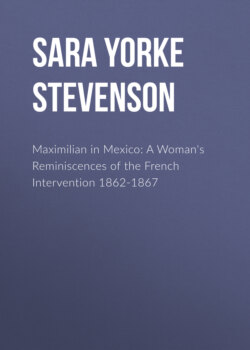Maximilian in Mexico: A Woman's Reminiscences of the French Intervention 1862-1867

Реклама. ООО «ЛитРес», ИНН: 7719571260.
Оглавление
Sara Yorke Stevenson. Maximilian in Mexico: A Woman's Reminiscences of the French Intervention 1862-1867
Maximilian in Mexico: A Woman's Reminiscences of the French Intervention 1862-1867
Table of Contents
Part I. The Triple Alliance, 1861–62 I. El Dorado … … … 1 II. The New "Napoleonic Idea". … 7 III. M. De Saligny And M. Jecker … 17 IV. The Allies In Mexico … … 24 V. Rupture Between The Allies. … 36. Part II. The French: Intervention, 1862–64 I. The Author Leaves Paris For Mexico . . 47 II. Puebla And Mexico—General De Lorencez—General Zaragoza . 66 III. The Siege of Puebla—General Forey—General Ortega . .82 IV. The French In The City Of Mexico—The Regency … 93. Part III. The Empire Of Maximilian I, 1864–65 I. Marshal Bazaine … . … 117 II. A Bed Of Roses In A Gold-Mine. … 125 III. Thorns … … … 136. Part IV. The Awakening I. "A Cloud No Bigger Than A Man's Hand" … 161 II. La Debacle … . … 188 III. Comedy And Tragedy. … 207 IV. General Castelnau. … . 232 V. The End Of The French Intervention … 256. Part V. The End I. Queretaro, 1867 … … 269
PRELUDE
PART I
THE TRIPLE ALLIANCE
MAXIMILIAN IN MEXICO. I. EL DORADO
II. THE NEW "NAPOLEONIC IDEA"
III. M. DE SALIGNY AND M. JECKER
IV. THE ALLIES IN MEXICO
V. RUPTURE BETWEEN THE ALLIES
PART II
THE FRENCH INTERVENTION
I. THE AUTHOR LEAVES PARIS FOR MEXICO
II. PUEBLA AND MEXICO—GENERAL DE LORENCEZ—GENERAL ZARAGOZA
III. THE SIEGE OF PUEBLA—GENERAL FOREY—GENERAL ORTEGA
IV. THE FRENCH IN THE CITY OF MEXICO—THE REGENCY
PART III
THE EMPIRE OF MAXIMILIAN I 1864–65. I. MARSHAL BAZAINE
II. A BED OF ROSES IS A GOLD-MINE
III. THORNS
PART IV
THE AWAKENING. I. "A CLOUD NO BIGGER THAN A MAN'S HAND"
II. LA DEBACLE
III. COMEDY AND TRAGEDY
IV. GENERAL CASTELNAU
V. THE END OF THE FRENCH INTERVENTION
PART V
THE END. I. QUERETARO, 1867
APPENDIX A
THE BANDO NEGRO (BLACK DECREE) PROCLAMATION OF EMPEROR MAXIMILIAN, OCTOBER 3, 1866
APPENDIX B
TREATY OF MIRAMAR, SIGNED ON APRIL 10, 1864
Отрывок из книги
Sara Yorke Stevenson
Published by Good Press, 2019
.....
The defeated army, as was invariably the case in Mexico, dissolved and disappeared, leaving only a residuum of small bands of guerrillas. These preyed impartially upon the people and upon travelers of both parties. Leonardo Marquez almost alone remained in the field and seriously continued the conflict. The principal leaders fled abroad, especially to Paris, where they made friends, and planned a revenge upon the victorious oppressors of the church, whose outrages upon God and man were vividly colored by religious and party hatred. Among these were men of refinement and good address, scions of old Spanish families, who, like M. Gutierrez de Estrada, found ready sympathy among the Emperor's entourage. As a rule, none but "hopelessly defeated parties seek the help of foreign invasion of their own land"; but the Empress Eugenie, who, a Spaniard herself, was a devout churchwoman, lent a willing ear to the stories of the refugees, impressively told in her own native tongue. To reinstate the church, and to oppose the strong Catholicism of a Latin monarchy to the Protestant influence of the Northern republic, seemed to her the most attractive aspect of the projected scheme.
The struggle that had been carried on for so many years in Mexico with varying vicissitudes was not purely one of partizan interest based upon a different view of political government: it was the struggle of the spirit of the nineteenth century against the survival of Spanish medievalism; it was the contest of American republicanism against the old order of things, religious and social as well as political; of progressive liberalism against conservatism and reaction.
.....